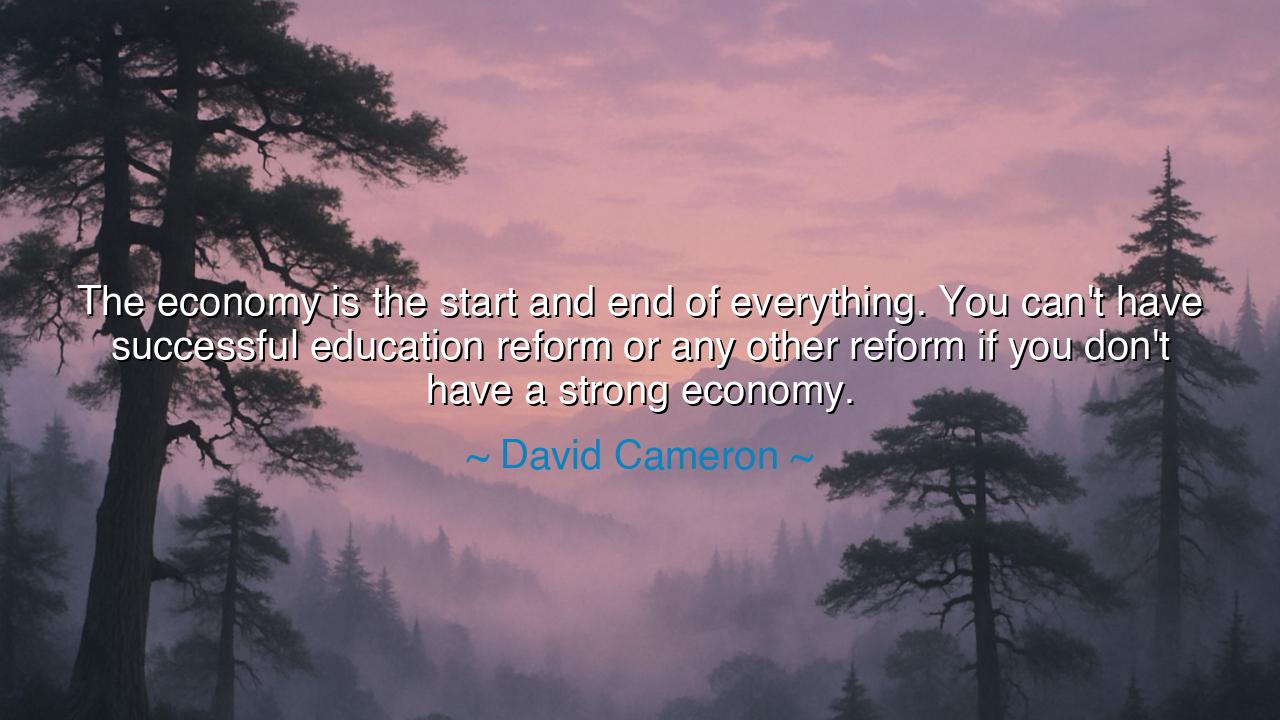
The economy is the start and end of everything. You can't have
The economy is the start and end of everything. You can't have successful education reform or any other reform if you don't have a strong economy.






In the measured and resolute words of David Cameron, “The economy is the start and end of everything. You can’t have successful education reform or any other reform if you don’t have a strong economy.” These words, spoken with the clarity of experience and the weight of governance, reveal a truth that has guided nations since the dawn of civilization. For though the spirit of a people may rise upon ideals, and their dreams may reach toward justice and enlightenment, it is the economy — the strength of their sustenance, the order of their labor, the balance of their trade — that sustains all noble endeavor. Without it, even the brightest reforms wither like seeds cast upon barren soil.
The origin of this statement lies in Cameron’s years as Prime Minister of the United Kingdom, when he sought to steer his nation through the storms of economic uncertainty that followed the global financial crisis. His words were not the rhetoric of theory but the reflection of necessity. He understood that education, healthcare, and social reform — all the pillars of a thriving civilization — depend upon the stable foundation of economic strength. A nation’s ideals may be lofty, but ideals without resources are like ships without sails — noble in purpose, but powerless in motion. Cameron’s quote thus calls us to recognize that before progress can be built, the foundation must be firm.
This truth is ancient. In the city-states of Greece, philosophers taught that a flourishing economy was the mother of philosophy itself — that men must first be free from hunger before they could seek wisdom. Plato himself, in his vision of the Republic, spoke of a society where every citizen had their rightful labor, for the harmony of work and provision was the root of justice. And in Rome, the strength of the economy sustained the glory of the empire: roads, aqueducts, libraries, and schools were all born from the wealth produced by the diligence of its people. When that wealth faltered, so too did learning and order. Thus, history itself confirms Cameron’s insight: that prosperity and progress are twins — one cannot survive without the other.
Consider the example of Japan after the ashes of World War II. A nation laid low, its cities in ruin, its spirit tested. Yet through discipline, innovation, and tireless labor, it rebuilt its economy brick by brick, idea by idea. And from that foundation rose schools, technology, and reforms that transformed Japan into a beacon of education, efficiency, and dignity. The strength of the economy became the engine that powered cultural and intellectual rebirth. From scarcity came innovation; from industry came enlightenment. This is the living proof that Cameron’s words are not only political — they are universal.
For education, though sacred in purpose, cannot thrive without sustenance. Teachers must be paid, schools must be built, and children must be nourished before their minds can open to learning. To speak of education reform without speaking of economic reform is to build palaces in the air. Likewise, every other form of progress — social justice, environmental protection, healthcare — depends upon the vitality of the nation’s purse. The economy, then, is not merely a measure of wealth; it is the heartbeat of a society’s possibilities.
Yet there is a deeper wisdom hidden in Cameron’s statement — one that applies not only to nations but to individuals. For what is a person’s economy, if not the management of their time, energy, and resources? Just as a nation cannot build reform upon debt and disorder, so too can a soul not build purpose upon chaos. Each of us must tend to our own foundation — to our livelihood, our discipline, our inner balance — before we can pursue higher callings. The ancient proverb whispers still: “He who would climb the mountain must first steady his footing.” So too, he who would seek greatness must first strengthen his base.
The lesson, dear listener, is both practical and profound: honor the economy, for it is the soil in which all dreams take root. Do not despise the mundane labors of work and trade, for they are the pillars that uphold progress. Let nations invest in the prosperity of their people, and let individuals build wisely the economies of their lives — their time, their effort, their virtue. Only when the ground is firm can the structure of reform endure.
So remember the words of David Cameron: a strong economy is not the end of progress, but its beginning. When the laborer’s hands are steady, the teacher’s voice can rise; when the marketplace thrives, the classroom opens; when the people prosper, wisdom, compassion, and justice follow. The economy is indeed the start and end of everything — for in its balance lies the rhythm of a nation’s soul, and upon its strength rests the destiny of all who call that nation home.






AAdministratorAdministrator
Welcome, honored guests. Please leave a comment, we will respond soon